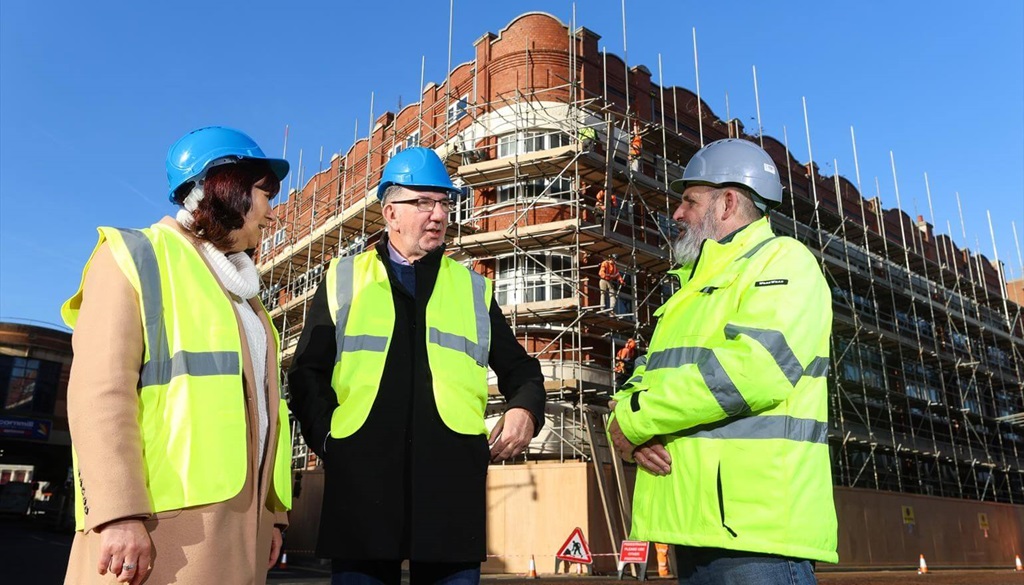Airport pushes on, claims return to profit
Reporting that it is back in the black for the first time in a decade, Teesside International Airport is advancing a hydrogen refuelling station and a test-bed for digital technologies.
Return to profit
TIA said that growth in passenger numbers and reaping the reward of investment in its business park developments helped it move back into profit for the first time since 2012.
Accounts for the year to March 2024 confirmed an EBITDA of £308,555 on annual revenues of £14.5m, TIA said, at a time when regional airports have struggled to find a way forward, as shown in South Yorkshire by the decline, closure and efforts to reopen Doncaster Sheffield Airport.
TIA said that the return to profitability is well ahead of its financial plan and came after Teesside enjoyed its highest passenger numbers for more than a decade due to high demand for flights to Spain, Portugal and Turkey.
Construction of the first unit on Business Park South has been completed, along with a new link road to the development, and a new Northside hangar, which will soon house aircraft painting company Airbourne Colours.
TIA said that significant growth in property and estate development values have driven the airport’s investment portfolio by 173% over five years to almost £50m.
A strategic independent review has been requested to assess and revise the airport’s 10-year financial sustainability plan, which is at the half-way stage of its 2019-2029 duration.
Managing director Phil Forster said: “This is a fantastic achievement and a reflection of the huge amount of hard work by all our staff to bring in new passengers, make the Teesside experience the very best it can be and develop our airport as a great location for businesses. I would also like to thank the airport’s board for their continued support in leading us forward.
“We still face strong headwinds but continue to have positive discussions with airlines to grow the number of routes on offer and will not stop in our work to deliver the ongoing success of the airport.”
The airport was bought from Peel by Tees Valley Combined Authority in 2019 for £40m, a deal that also included 819 acres.
Tees Valley Mayor Ben Houchen said: “When we took back control of our airport I pledged that we would return it to profit, and we have now delivered on this well ahead of our financial plan.
“Not only have we brought back the sunshine destinations that the people of Teesside, Darlington and Hartlepool want, but we are also benefiting from the long-term development of the airport’s business park that is paying dividends by bringing well-paid jobs and major investment to the local economy.”
Plans had been aired to invest £20m in a new railway station for the airport, part of the reallocations from HS’s scrapping, but Teesside may now have to convince a Labour government thus far cautious on transport spending that the project is one worth backing over competing projects.
Hydrogen facility
Four publicly accessible hydrogen refuelling stations are being created in the region as part of the Tees Valley hydrogen transport hub.
The quartet, funded by the UK government, will supply airport vehicles as well as delivery trucks, vans and other vehicles fuelled by hydrogen.
Plans for the one of the stations, at Teesside Airport, have now been submitted to Darlington Borough Council. Hydrogen refuelling company Element 2 is leading on the plans as ambitions to increase the use of hydrogen as a transport fuel grow.
The new station, lined up for land near the former St George Hotel, will support the airport’s push to become operationally net zero by 2030.
Forster said: “We’re all working very hard to make Teesside a modern airport pushing boundaries and making people proud. We’re flying more people to more destinations, but we’re also adding more strings to our bow, with our cargo facility, the business park, new hangars and our green energy ambitions.”
Teesside Airport was home to a temporary refuelling station and secured low-emission hydrogen fuelled vehicles in 2021 – including cars, truck, forklift, van and tug – as part of a regional trial.
Funding for the wider project comes from Innovate UK, the UK’s innovation agency.
Digital zone
Consent is also now being sought from Darlington Council for a 5G-enabled digital test bed, which could see a private network cover a large stretch of Teesside Airport’s north side to help carry out a wide range of trade, goods movements, and digital processes.
A facility to test freight-scanning software tech, a covered workshop and cabins, and lighting and security fences would all be covered. The £3.5m project was signed off by the Teesside Freeport board in December, the airport being classed as a customs zone within the Freeport’s boundaries.





